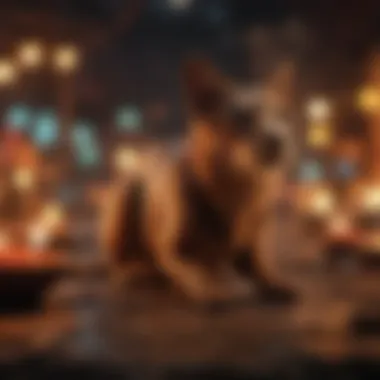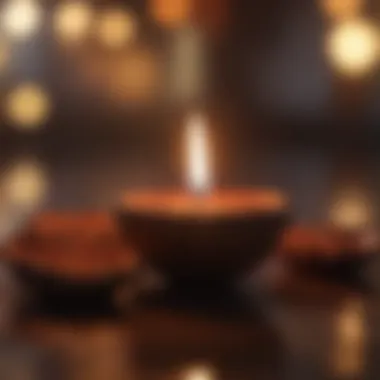Diwali 2023: Cultural Significance and Modern Celebrations


Intro
Understanding Diwali in this current year is essential as it captures the pulse of this significant festival. Diwali, also known as the Festival of Lights, is a celebration rooted in rich traditions and outstanding memories for many families. Each year, this festival transforms, influenced by modern emerges and values, yet retains its core essence.
As we explore Diwali this year, we'll look into various aspects that define our celebrations. From its cultural and spiritual importance to its evolving societal role. This examination reveals how communities come together and keep traditions alive in new forms. Through this exploration, we'll also address environmental sustainability as an integral part of our festivities.
Nature Topic Overview
Diwali marks a time of joy, festivity, and reflection. It signifies the victory of light over darkness and good over evil. As families prepare to light up their homes with diyas, or lamps, it is also vital to acknowledge the changes in how this festival is observed today. Chain reactions stemming from globalization, urbanization, and environmental consciousness have reshaped common traditions. It's essential to grasp these shifts to understand their meaning in contemporary society. Preparing for the sparkle of this festival inspires a deeper connection to cultural history and personal relationships.
Fun Facts and Trivia
- Did you know that different regions of India celebrate Diwali in their specific unique ways?
- For instance, people in West Bengal worship Goddess Kali instead of Lord Rama.
- The festival typically lasts for five days, each with specific rituals and significance.
- In 2023, Diwali falls on November 12th!
These bits of trivia not only make learning about this festival fun, they can also ignite curiosity in young minds to learn its background and customs related to celebration.
Cultural Celebrations
Festivals often bring history to into present forms. During Diwali, the streets emerge with vibrant visual landscapes with breathtaking rangolis adorned in intricate designs spilling across doorsteps. Apart from great treats being prepared at homes, splendid firework displays light up the skies punctuating the nighttime.
Diwali is further enriched through rituals, such as gathering families for pooja, or prayers, making the experience both personal and communal. Experiencing and sharing memories connected to Diwali nurtures ties between generations.
Environmental Awareness
While Diwali is a vibrantly celebrated festival, issues related to the environment have gradually gained traction among festival-goers. Concerns about air pollution from fireworks and waste from single-use decorations have initiated discussions about conserving the environment during a time of joy. Here are some simple measures to consider for a more sustainable Diwali:
- Opt for eco-friendly ganesh and kali idols instead of traditional synthetic ones.
- Choose less harmful or green firecrackers.
- Use reusable decorations made of cloth or paper.
Being vigilant while celebrating ensures that the joy resonates with our surrounding nature.
DIY Nature Activities
Engaging in fun activities during Diwali can inspire appreciation of nature and traditions. Here are some ideas:
- Make Rangoli: Utilize flower petals, diverse grains, or colored rice to design artistic shapes at home while celebrating creativity.
- Create Paper Lanterns: Repurpose scrap paper and make lanterns. They help to give a lively hue to your surroundings passed down through generations.
- Family Nature Walks: Use the evenings as a family effort to observe natural aspects during the Diwali night, appreciating the connections we hold to the earth.
These simple projects can help reinforce valuable concepts in accessible formats and strengthen family and community bonds around Diwali.
By merging traditions with perspectives on sustainability, Diwali within this year offers lessons for generations to come while staying true to cultural significance. Understanding these evolutions presents an immense opportunity to create spaces where joy exists within responsibility. Each celebration this year will eternally reflect light meant to share and foster.
"Light is the powerful bridge that surrounds us in times of expectance and aspiration."
Enjoy your preparations for Diwali, embracing the knowledge entwined and learning from each significant moment we share with our families and communities.
Understanding Diwali
Diwali, also known as Deepavali, represents more than just a festival of lights. This time, its examination involves assessing its multi-faceted aspects spinning from history to modern significance. This section discusses why understanding Diwali matters, particularly while we step into 2023.
Knowing the historical significance allows people to appreciate the depth of customs and rituals observed. The religious context highlights how diverse beliefs influence celebrations across regions, while cultural relevance showcases the vibrant art and traditions pivotal to society. With our globalizing world, understanding these dimensions becomes vital.


Historical Significance
The origins of Diwali spark dialogues that traverse time and space. Traditionally linked with the return of Lord Rama after defeating Ravana in the Hindu epic Ramayana, it gained the status of a vibrant festival marking the win of light over darkness, knowledge over ignorance. The diversity in customs, crossing religions such as Hinduism, Sikhism, Jainism, and Buddhism enriches its story.
One crucial development through history is the rekindling of communal values, drawing people together beyond their differences. The idea of celebrating with everyone creates unity, with sacredness enveloping social activities. Recognizing such backgrounds adds layers to festivities, intertwining respect and importance long-held by various communities.
Understanding historical events enhances our ability to forge a respectful present while celebrating together.
Religious Context
Exploring the religious impact of Diwali helps us comprehend the spiritual paths followed by millions. For Hindus, this period signifies the worship of Goddess Lakshmi, the deity of prosperity. Sikhs celebrate the establishment of the Khalsa and consider this time sacred too.
Each faith adapted or tailored celebrations to reflect their narrative, which provides a magical insight into the spiritual world. Teaching children about these beliefs emphasizes tolerance and respect towards others.
During Diwali, practices such as puja or prayers become gateways to amounting respect and devotion. Incense sticks mentioned often bring participants closer to the divine, highlighting their emotional connection with spirituality throughout the season.
Cultural Relevance
The vibrancy of Diwali in cultural significance taps into artistic expressions, local cuisines, music, and festivities that bring together families. From the colorful rangoli patterns at doorsteps to candles gracing windows, artistic representations fluidly participate at this of the year.
With regional variations, alterations display nuances equally proud of their roots. For children, learning these cultural expressions not only showcases diverse traditions but fuels creativity. Parents can foster this knowledge through storytelling that sparkles vibrant life. Help children describe retrieved memories that ease any anxiety while embracing the culturally vast festival.
The evolution of Diwali encapsulates the complexity of living in a multicultural landscape. With these themes woven into communal experiences, Diwali transcends its joyous dimension, becoming a platform of understanding both for young minds and parents alike.
Diwali Preparations This Year
Diwali preparations serve as a vital component in ensuring the festivities resonate with cultural significance and personal meaning. This year, the spirit of readiness is marked by transition from traditional to contemporary methods, ensuring the age-old customs remain relevant. Each aspect—decoration, rituals, and gifts—collaboratively enhances the vibrancy of the celebration, fostering a valid connection between the community, family, and environment.
Home Decoration Trends
The importance of home decoration during Diwali cannot be overstated. Homes turn into vibrant representations of light, creativity, and spirituality. This year, many families are embracing minimalist yet modern design principles. Reflecting a focus on sustainability, numerous households invest in eco-friendly materials such as natural, reusable decorations.
Popular trends include the use of clay diyas and eco-conscious choices for colorful rangolis made from flowers or organic colors instead of synthetic powders. The utilization of LED lights allows families to balance grand displays with studies energy efficiency. In recent times, more people also opt for themes that reflect cultural roots while modernizing the aesthetics. These choices contribute to a festive atmosphere that is both welcoming and sustainable.
Ritual Practices
Ritual preparations form the backbone of Diwali, reinforcing community and spiritual bonds. Across various cultures, rituals can slightly differ, but the essence remains solid. Cleaning homes is a common practice as it signifies inviting Goddess Lakshmi into the household. Many families today also involve their children, instilling traditional values while offering a chance for shared bonding.
Puja ceremonies take precedence, with families arranging beautiful altars adorned with flowers and sweets. Traditional involvement is being supplemented with technology, including live-streaming or apps that guide through the procedures and mantras. This integration not only helps maintain the rituals’ authenticity but also aids in fostering inclusivity for members who might be afar yet wish to participate actively.
Gifts and Sweets
Gift-giving is an indispensable part of Diwali, acting as a token of love and goodwill. In 2023, the shift towards personalized gifts is notable. Homemade sweets and savouries hold immense value as they also convey feelings of warmth and care. Families often opt for dietary-friendly options, ensuring everyone enjoys the delights without worrying about dietary restrictions.
There has also been a massive jump toward purchasing gifts that advocate for ethical choices. Items like handmade crafts, or gadgets that demonstrate technological advancement yet align within sustainability paradigms, underscore the evolving mindset toward the celebration. Group gifting practices are also increasing, where individuals pool resources to present higher-value items, emphasizing collaboration and togetherness.
Diwali brings us together in celebration, bridging generations through traditions and innovative practices together.
Celebrating Diwali in Modern Times
The celebration of Diwali has transformed significantly in contemporary society. This year, like any other, it retains deep cultural resonance while embracing changes brought on by modern influences. Through the lens of changing perspectives, understanding how Diwali is celebrated today is crucial for appreciating its ongoing importance in diverse communities.


Regional Variations
Diwali's cheer is felt worldwide, yet, regional variations bear witness to local identity and traditions. Each area brings unique customs, food, and rituals. In North India, for example, people often light diyas and exchange sweets. In Gujarat, dance and music are integral components of the festivities, often leading families to create elaborate garba performances.
On the other hand, those in South India may focus on the worship of goddess Lakshmi, making special offerings and performing rituals to seek her blessings. The ways families engage with Diwali vary markedly, influenced by local heritage and communal dynamics. This diverse representation reinforces the idea that Diwali is not a monolithic festival, but a tapestry of shared celebrations, lived differently based on geography and tradition.
Impact of Technology
In the age of the internet, technology shapes every aspect of our lives, including festivities like Diwali. It's not only about lighting lamps and fireworks anymore; technology broadens how people connect and share experiences. For many, social media platforms such as Facebook and Instagram become vital spaces for sharing celebrations, images, and stories. Families separated by distance can utilize video calls to conduct puja together or enjoy a meal 'virtually'.
Moreover, e-commerce facilitates the purchase of gifts and treats, enabling to connect and go shopping without stepping out of their homes. In doing so, it underscores convenience while making traditional practices accessible to urban populations. The advancement in digital payment methods enables quick and easy gift-giving, adapting traditions to modern lifestyles while retaining their essence.
Virtual Celebrations
This year, some families may opt for virtual celebrations, serving as both an alternative and an addition to in-person gatherings. In circumstances where family members can't convene due to distance, health advisories, or other obligations, virtual tools have become a critical mechanism for fostering connection. Platforms like Zoom or Google Meet facilitate entire gatherings, where families perform rituals as if together. Thus, Diwali is no longer exclusively a physical occasion.
Nevertheless, the absence of direct interaction does pose challenges. While virtual celebrations are handy, they may lack the physical warmth and reallife interactions that come from sharing space. Bridging in-person engagement with online conveniences demands a balanced approach to experience the festival fully.
Technology has enhanced and expanded the traditional celebrations of Diwali, making it more inclusive for diverse groups across the globe.
Modern times have forced the celebration of Diwali to evolve, leading to a blend of both old and new traditions. Engaging younger generations through such practices may help retain cultural essence while welcoming innovative influences into festivity. The importance of celebrating Diwali today clearly lies in its ability to adapt, thus ensuring its survival and relevance for generations ahead.
Community Involvement During Diwali
Community involvement plays a crucial role in enhancing the celebratory spirit of Diwali. It creates a sense of togetherness and shared experience that transcends individual households. By engaging in communal activities, people strengthen their bonds and work towards common goals. This year's emphasis on collaboration sheds light on how communities can collectively uplift one another.
Several key elements drive the sense of community during Diwali:
- Strengthened Relationships: Community activities promote connection among neighbors.
- Cultural Sharing: Celebrations foster appreciation of diverse traditions and practices.
- Resource Sharing: Support systems emerge as people exchange goods and services, improving quality of life.
This year, community involvement has shown a real resurgence, suggesting that this practice not only preserves traditions but also enriches communal ties. As we explore further, we will delve into charitable initiatives that mark the spirit of giving during this festive time, identify local events and gatherings that emphasize community, and share insights on family activities that translate into shared joy.
Charitable Initiatives
Charitable initiatives serve as a centerpiece for community involvement during Diwali. Many organizations, both local and larger charity groups, use this festive season as a chance to support the underprivileged. There are various ways this is accomplished, such as food drives, clothing distribution, and provision of educational materials for children in need.
Participation in these charities has multiple benefits:
- Fostering Empathy: Volunteers become more aware of others’ challenges.
- Strengthening Community Bonds: Working together for a cause unifies individuals.
- Spreading Joy: Small acts of kindness create ripples of positivity.
People often donate food items like sweets or other traditional Diwali treats. Not only is this customary, but it also ensures everyone can partake in the festive indulgences of the season.
Local Events and Gatherings
Local events often serve as the glue that holds subsequently festive activities together. By allowing members of the community to come together, such events reinforce both cultural and social cohesion. This includes everything from Diwali fairs to cultural programs, where diverse groups showcase their talents.
Some examples of local events might include:
- Cultural Dance Performances: Presenting traditional dances allows sharing of heritage.
- Craft Stalls: Local artists showcase their works, enabling the public to discover their talent.
- Community Feasts: Sharing meals creates a spirit of belonging and connection.
It’s not just about heartwarming social moments; these gatherings empower local businesses and artists while spreading the joyous essence of Diwali.


Family Activities
Family activities during Diwali not only enhance enjoyment but create lasting memories. Families often come together to partake in rituals, games, and culinary ventures.
Some engaging family fun ideas include:
- Crafting DIY Decorations: Together, families can make Rangoli or brighten the home with hand-crafted items.
- Cooking Traditional Recipes: Preparing favorite dishes helps teach children about lineage while nurturing teamwork.
- Storytelling Sessions: Sharing tales around Diwali adds a historical context and passes on cultural notes.
These activities also serve a dual purpose of education and recreation. By involving children, families help foster a sense of identity tied to their heritage.
In exploring community involvement this year, it becomes apparent that Diwali transcends mere celebration. It manifests as a potential to strengthen connections, support those in need, and pass on cherished traditions to the next generation.
Environmental Considerations
Diwali, known as the festival of lights, has a profound environmental impact. Over the years, our celebrations have sometimes ignored the planet’s well-being. This section takes a closer look at the actions being taken to make Diwali more enjoyable for both people and the Earth. Awareness of sustainable practices is becoming ever more critical as we celebrate this cherished festival.
Sustainable Celebrations
This year, celebrations are increasingly focusing on sustainability. More families are choosing to decorate their homes with eco-friendly materials, such as homemade diyas made from clay rather than plastic ones. Natural colors made from flowers, spices, and food items are replacing synthetic ones for rangoli designs, creating art that is as beautiful as it is kind to the environment. This shift to more thoughtful celebrations aligns with respect for nature and supports local artisans.
- Using pet-friendly decorations ensures we do not harm pets.
- Local markets are preferring smaller, community-driven produce to reduce waste.
- Crafting gifts from recycled materials can add a personal touch while minimizing waste.
This not only helps the environment but also brings a sense of community by supporting local artists and producers.
Waste Management Practices
It is essential to consider how we manage waste during Diwali. While celebrations can leave behind wrappers, empty packets and festooned trash, efforts are being made to manage waste effectively.
- Segregating waste into biodegradable and non-biodegradable components assists in proper disposal.
- Using reusable or upcycled materials helps in reducing the quantity of generated waste.
- Local waste collection agencies often conduct campaigns encouraging recycling and proper disposal of materials.
These measures could significantly diminish waste produced during the festivities, ensuring cleaner surroundings.
Impact of Fireworks
Fireworks are traditionally associated with the festival of Diwali. However, their adverse effects are becoming well-known. Many communities are choosing to limit fireworks due to pollution and environmental concerns. The smoke emitted from the crackers can pose serious health risks; however, the joy of the occasion does not entirely need them.
Future of Diwali Celebrations
The future of Diwali celebrations holds immense relevance in today's fast-paced world. With evolving cultural influences and global perspectives, the way festivity is embraced is transforming. This section sheds light on how changes in societal norms and attitudes shape the Diwali experience, including festivity adaptations and environmental considerations.
Emerging Trends
Emerging trends are indicative of shifting priorities among communities. Eco-friendly practices are on the rise. Many people are now opting for sustainable options when decorating homes. Biodegradable materials, natural colors, and energy-efficient diyas (lamps) take center stage. The commitment to reducing pollution is transforming the festive atmosphere.
Incorporating technology is equally important. Virtual celebrations continue to flourish, allowing families and friends connected remotely to partake in festivities. Innovations in art and decoration make celebrations more engaging, reflecting modern creative expressions. The importance of harnessing digital platforms for promoting ethical values grows, enhancing connection amidst physical separations.
Preserving Tradition
Despite the emergence of new trends, preserving tradition is vital. Customs serve as a cultural bridge linking generations. Families are encouraged to continue rituals such as Lakshmi puja, storytelling, and lighting of diyas at home. Documenting the legacy ensures newer generations recognize their cultural roots.
Additionally, integrating modern methods with traditional practices enriches Diwali celebrations. For example, using traditional recipes in a digitally-shared format can help heritage food be treasured. This sharing fosters understanding and appreciation for cultural lineage.
Youth Engagement
Engaging the youth is a critical component affecting the future of Diwali. Youthful perspectives infuse fresh ideas yet help maintain the core values of the festival. Educational workshops and interactive events nurture interest in cultural heritage. Encouraging school projects centered on Diwali themes allows children to experience A sense of connection with their backgrounds.
Social media platforms enable the youth to share ideas about celebrations with a global reach. Experiences both shared and gained further enlightenment around festivities by incorporating diverse perspectives. This communal spirit draws young individuals together and unites diverse groups through the bonds of cultural expressions.







